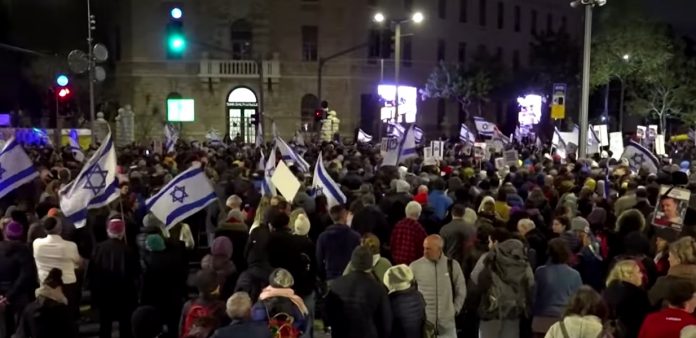Protests rarely work against a determined government that cares only for power
Political protests can generate an overpowering euphoria. Passionate people, often young and idealistic, swear to each other that tomorrow will be different: Together they’ll change the world. And then tomorrow comes, and the world is as before.
I have seen and participated in and covered innumerable protests around the world. Generally the psychology of participants says that if so many agree with us then we cannot be wrong, should not be ignored and will not be denied.
There is an interesting paradox at play.
When these sentiments are deployed against despotic regimes, or regimes with minimal legitimacy, they can cause the leadership to wobble. Dictatorships and their backers – perhaps the military, perhaps a great power – like stability, which greases the wheels of corruption. That’s how it was in Egypt and in Ukraine in years past. Perhaps one day it will work in Iran and Russia as well.
Protests in democracies are strangely less effective, since they clash with one of two animating principles: On one hand liberal democracy gives you the right to protest; but on the other hand electoral democracy means the government was elected by a majority (except in the US) who probably disagreed with you on election day and still do today. I watched protestors try like hell to bring down the post-communist government of Romania in the 1990s. The ruling party didn’t care, and they kept winning elections – until they did not.
That’s why polls are so important in these situations. That’s why they are practically a public service when they’re accurate, based on professional methodology, and not part of disinformation campaigns. If the polls show the public has turned against the government, it might then change its policies or otherwise adjust, fearing it will otherwise lose the next election.
If the failure of the government is colossal enough, and public opinion has turned against it decisively enough, the protestors may be hoping that the government might resign. Those conditions absolutely apply in Israel today, where protests intensified this week, with tens of thousands converging on the government and parliament complex in Jerusalem: the government is failing and unpopular. But Prime Minister Benjamin Netanyahu it is demonically driven to hang on.
The protests against him are a confection of Israeli flags and rousing speeches and nostalgic music. They are about little children on the shoulders of parent-protestors who see themselves, with not-unjustified arrogance, as the best version of Israel — the spiritual (and in some cases actual) heirs of the founders of the country.
Many of them, quite clearly, are the same protesters who targeted Netanyahu for months before the Oct. 7 Hamas massacre that sparked Israel’s war on the group in Gaza. Already predisposed to distrust the prime minister, they suspect him of dragging out the war because he thinks doing so will buy him more time in office — and thus a better position from which to machinate postponements in his ongoing trial on bribery and other corruption charges. That might or might not be fair: in fact, Hamas has yet to present an offer to lay down its arms.
Either way the protestors want Netanyahu gone, with a combination of terrible anger, agonizing despair and idealistic passion. Polls show three-quarters of the public agree, and a strong majority would vote against the existing right-religious coalition in an election held today.
Netanyahu in the 1990s argued for term limits. But the version of today has evidently not had quite enough. He wants to stay until the nest scheduled vote, in 2026, and then run again.
Netanyahu has progressively weeded out politicians who might stand against him from his Likud Party. The only member of his coalition of 63 backers in the Knesset — out of 120 members — who has shown signs of a backbone is Yoav Gallant, the ex-general defense minister. So even without Gallant, Netanyahu could hold on to a majority.
If the protestors can’t get Netanyahu ousted from office, they at least want him to do more, visibly and persuasively, to aim for a deal with Hamas for a return of at least some of the more than 130 hostages remaining in Gaza (many of whom the military says have died). That message received new force this weekend, when the families of many of the hostages joined in the demonstration.
They also consider that after almost six months of war against an enemy that has no tanks or planes, and yet is somehow managing to continue firing rockets at Israel, the war is not going well. Israel is badly isolated internationally, especially after the United Nations Security Council voted in favor of a ceasefire resolution last week. Netanyahu is at loggerheads with Israel’s main global defender, President Joe Biden; countries that previously had steady relationships with Israel, like Canada, are ending arms sales; there is a genocide investigation against Israel at the Hague; and international economic sanctions are becoming far from impossible to contemplate.
This, after almost a year in which Netanyahu’s coalition tried to undermine Israel’s liberal democracy. The key elements of that plan, which appears to have been stopped by local protests, global markets and Palestinian jihadists, were to have the government appoint puppet-judges, to have parliament be able to overrule them as needed, to eviscerate the gatekeepers and enable the coalition to ban the opposition. “Putinization” may be a gentle nickname for what they had in mind.
Protesters want everyone to understand that Netanyahu’s path on all fronts has created a disaster, and they want the stubborn premier to admit even an ounce of responsibility for the epic breakdown of security, intelligence and strategy that was Oct. 7.
Some expect the religious parties in the coalition to bolt if the government fails to pass a law formalizing the sector’s mass draft evasion, after the Supreme Court last week brought the policy close to a legal end (which has strong public support; the draft evasion enrages most Israelis). And that may yet occur, if the government is unable to find a clever workaround scheme. But don’t be surprised if they stay put; nothing better awaits them in the opposition.
And so, all the protestors and polls and polemics may yet crumble before practicalities. You could have armies invading and inflation at a thousand percent and the power grid collapsing and a plague of locusts looming, and nothing would change if Netanyahu was able to keep his 60-odd lawmaker-lemmings in line.
That inertia is making Netanyahu’s opponents a little crazy. In a presidential system, like the American one, it’s expected that nothing can be done until the next election – so there is not much disappointment when the protests lead to nothing. But in parliamentary systems, governments as cataclysmic as this one really are supposed to fall or resign.
Netanyahu’s insistence on hanging on at all costs is rare, and the arguments he deploys are interesting to explore.
He argues that wartime is no time for politics – but that only fuels the suspicion that he is purposely prolonging the war. He insists that the people made their choice in November 2023. But the truth is that the election was a tie, and his majority came about purely because of lost votes cost by opposition splits. He says democracy must be respected. But Israeli elections do not include one quarter of the population that is under the control of Israel – namely, the West Bank’s 3 million Palestinians; that’s not even a true democratic mandate, critics would say.
What options are left, other than enduring what looks like madness for almost three more years? Some protestors seem to be yearning for a military coup, frankly. But that’s a sign of desperation, not a plan. And there are reasons for that desperation that will outlast the Gaza war, and even Netanyahu. Because Israel is so desperately divided between liberals and traditionalists in their various stripes, and polarization is so strong, it’s hardly evident what a common future might look like.
Still, as the protest chants soared above Jerusalem this week, some demonstrators begin to look like they have hope. Such hope may not really spring eternal, but it is human nature to try to keep desperation at bay. In Egypt as in Israel, in Iran as in Belarus, and in America as well should Donald Trump be elected in November, there will always be those willing to go out into the streets, hoping for a better day.
Israel’s future depends on a Haredi draft. Can it survive implementing one?


















